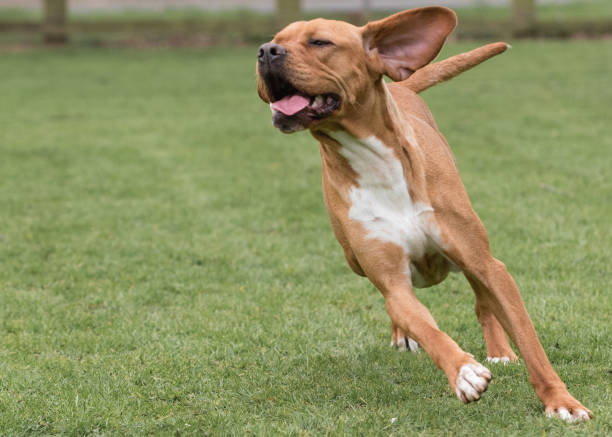Portuguese Pointer

Breed History:
The Portuguese Pointer, or Perdigueiro Português, is an ancient gun dog breed that traces its roots back to the 12th century in Portugal. Originally developed as a falconry assistant and bird-hunting dog, it is believed to have descended from the Peninsular dogs of Iberia, sharing ancestry with other pointing breeds like the Spanish Pointer.
During the 18th century, the Portuguese Pointer influenced the development of the English Pointer when British sportsmen imported them for breeding. The breed remained highly prized in Portugal for its effectiveness in hunting partridge (perdiz), hence the name Perdigueiro.
Though its numbers declined in the 19th century, it was preserved by dedicated breeders and was officially recognised by the Portuguese Kennel Club in 1938 and later by the FCI.
Considering adopting a pointer breed? Check out our page "How to look after a Pointer" detailing what to consider before adopting and our recommended products.
|
Gender |
Height |
Weight |
|
Male |
48-60 cm |
18-27 kg |
|
Female |
46-58 cm |
16-25 kg |
Size – Medium
Life Expectancy: 12–14 years

Breed Appearance:
The Portuguese Pointer is a well-balanced, squarely built dog with a distinctively short, broad head and pronounced stop. Its medium-sized, expressive eyes are amber or hazel, and the ears are set high and hang in a triangular shape.
Its coat is short, dense, and coarse, with a velvety texture on the ears and face. Common coat colours include light yellow, brown, or fawn, often with white markings. The breed has a muscular frame and moves with a fluid, efficient gait—ideal for covering ground in the field.
Breed Type – Gun Dog/Companion:
Originally bred as a hunting pointer, the Portuguese Pointer is a versatile and tenacious bird dog with an innate talent for locating and “pointing” upland game. It has a keen nose, excellent stamina, and a passionate work ethic.
At home, it is gentle, loyal, and affectionate, making it a wonderful companion animal for active families or hunters. This breed bonds strongly with its people and thrives when included in daily activities.

Training:
The Portuguese Pointer is intelligent, eager to please, and responsive to training, especially when started early. It excels in field work, obedience, and agility, and has a natural ability to focus and cooperate with handlers.
Training should be consistent, positive, and mentally stimulating. Harsh methods may cause it to shut down, as the breed is sensitive by nature. Early socialisation ensures it develops into a confident and adaptable adult.
Health & Care:
This is generally a healthy and hardy breed with few breed-specific genetic issues. Still, some conditions to be aware of include:
-
Hip dysplasia
-
Elbow dysplasia
-
Ear infections (due to drooping ears)
-
Eye issues in rare cases
Routine veterinary checkups, regular ear cleaning, and a nutritious diet tailored to active dogs are essential. Maintaining a lean body condition helps prevent joint strain.

Living Conditions:
The Portuguese Pointer adapts well to country or suburban life, especially with access to a yard or safe outdoor area. It is not ideal for apartments unless the owner is highly active and committed to meeting their exercise needs.
This breed loves companionship and does best when it can stay close to its humans. It should not be left alone for extended periods, as it may develop separation anxiety or destructive behaviours.
Exercise:
As a hunting breed, the Portuguese Pointer requires moderate to high daily exercise—at least 60 to 90 minutes of activity, including brisk walks, runs, or off-leash play in safe areas.
It enjoys field training, fetch games, scent work, and mental challenges like puzzle toys. Without adequate physical and mental stimulation, it may become restless or bored.
Grooming:
The Portuguese Pointer is low-maintenance when it comes to grooming. Its short, dense coat only needs weekly brushing to remove loose hair and maintain coat health. It sheds moderately year-round.
Baths are needed occasionally, especially after field work. Regular ear checks, nail trims, and dental hygiene are important, particularly due to its pendulous ears, which can trap moisture and debris.

Advantages:
-
Excellent bird dog with strong pointing instinct
-
Loyal, affectionate, and people-oriented
-
Easy to train and intelligent
-
Low grooming needs
-
Strong work drive and high stamina
-
Adaptable to family life with proper exercise
Disadvantages:
-
Needs significant daily exercise and mental stimulation
-
Not suited for sedentary or low-activity homes
-
May be reserved or shy without early socialisation
-
Can develop separation anxiety if left alone frequently
-
Sensitive nature requires gentle, positive training methods
-
Prey drive may make it unsuitable for homes with small pets

